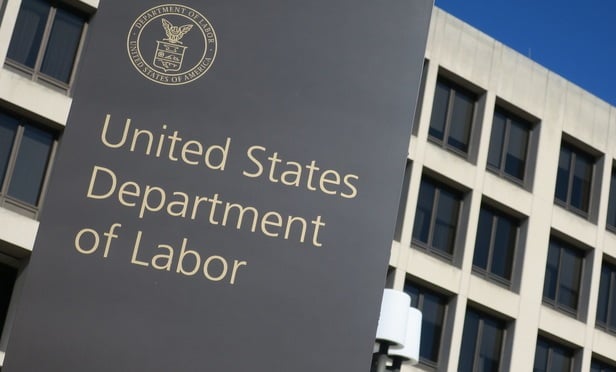 Under the new rule, the "standard salary level" has been raised from the currently enforced level of $455 to $684 per week (equivalent to $35,568 per year for a full-year worker). (Photo: Mike Scarcella/ALM)
Under the new rule, the "standard salary level" has been raised from the currently enforced level of $455 to $684 per week (equivalent to $35,568 per year for a full-year worker). (Photo: Mike Scarcella/ALM)
The Department of Labor has announced a final rule that it says will make 1.3 million workers eligible for overtime pay under the Fair Labor Standards Act.
The rule, according to the DOL, updates overtime regulations with new earnings thresholds "necessary to exempt executive, administrative, or professional employees from the FLSA's minimum wage and overtime pay requirements, and allows employers to count a portion of certain bonuses (and commissions) towards meeting the salary level."
"Today's rule is a thoughtful product informed by public comment, listening sessions, and long-standing calculations," said Wage and Hour Division administrator Cheryl Stanton. "The Wage and Hour Division now turns to help employers comply and ensure that workers will be receiving their overtime pay."
Related: Obama-era overtime rule: not dead yet
The rule does boost salary levels from where they were in the currently enforced 2004 rule, but falls far short of a final rule passed during the Obama administration that would have taken effect on December 1, 2016 but was blocked in court from being implemented. That rule would have raised the threshold from its 2004 level of $23,660 to $47,476. The Trump administration's version affects far fewer people and raises the pay level far less.
Under the new rule, the "standard salary level" has been raised from the currently enforced level of $455 to $684 per week (equivalent to $35,568 per year for a full-year worker). It also increases the total annual compensation level for "highly compensated employees" from the currently enforced level of $100,000 to $107,432 per year.
In addition, it allows employers to use nondiscretionary bonuses and incentive payments, including commissions, that are paid at least annually to satisfy up to 10 percent of the standard salary level, in recognition of evolving pay practices, and revises the special salary levels for workers in U.S. territories and in the motion picture industry.
States that have not been happy with the preemption of the Obama administration rule have taken action on their own to expand the number of workers eligible for overtime pay.
The new rule will take effect on January 1, 2020.
Read more:
© 2025 ALM Global, LLC, All Rights Reserved. Request academic re-use from www.copyright.com. All other uses, submit a request to [email protected]. For more information visit Asset & Logo Licensing.







